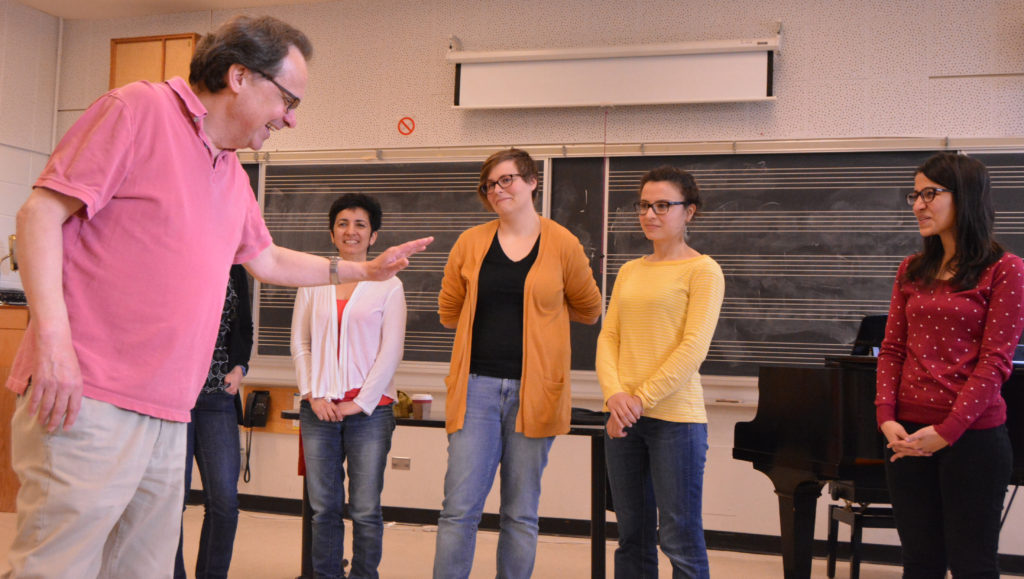
Your talk is next. There are hundreds of people in the audience. Your heart is beating so loudly you wonder if the person beside you can hear it. What if you screw up? You can’t focus on the speaker even though you had wanted to hear her for years
Is this you before your talk—or before your thesis presentation, or a job interview? What if you could train to reduce that anxiety? What do actors do? These thoughts led me to create “Act your Science?” at the University of Calgary. Did it help? Read on!
I came across the idea of using improvisation training to improve science communication skills years ago through Youtube. Alan Alda, a well-known actor (including the “MASH” television series), applied his acting and improvisation training to help scientists improve their communication. He developed the Alan Alda Centre for Communicating Science at Stony Brook University. You can see some information here
https://www.youtube.com/watch?v=JtdyA7SibG8
There is a testimonial from Boston University in this link.
https://www.youtube.com/watch?v=1Fwr3fNNLbY
I stored that info. After all, I did drama in high school—this could be fun and interesting.
My interest in scicomm led me to setting up such an improvisation course although the journey didn’t start with that goal. I took the Banff Science Communication course with amazing communicators like Jay Ingram, Mary Anne Moser, John Rennie and more. I was surprised to see that improvisation was included. The next incentive for starting an improvisation course came after I joined the Canadian Science Writers Association (now now the Science Writers and Communicators of Canada). I met Janice Benthin, the Executive Director. She had been thinking about organizing improvisation with Calgary members and had made contact with Dennis Cahill—artistic director of the Loose Moose Theatre company in Calgary and one of Canada’s top improvisation trainers.
It began to feel like we had an idea that might be achievable.
Who would come, and how would we pay for it?
I wanted to do something special for graduate students in the area of STEM research at the University of Calgary. I approached the Graduate Students Association for funding through their “Quality Money” program and voila—we had funding. I approached the Faculty of Graduate studies for administrative help and ideas—and voila, we had rooms and a recruitment plan.
A month later, “Act your Science” was born. I was in a room at the University of Calgary together with 15 graduate students, Dennis, and a lot of uncertainty about whether this was going to work.
In short, we had an absolute blast. The main theme running through the course was the idea of learning to fail gracefully in front of an audience. Training with this in mind greatly reduced “presenter anxiety”. The group began very tentatively as expected. There were a lot of pauses and embarrassed looks to each other. By the end, people were jumping up from their seats to volunteer. The transition from not wanting to be in front of people, to knowing you can have a good time even if you make a mistake, was complete. The comfort level with presenting, even in those where English is a second language, was much higher. In the final evaluations, everyone said that their ability to communicate was improved.
And, bonus, we learned even more. A second big theme was to “be in the moment”. We learned how to focus on the message, the story, and the others on stage—all while maintaining connection with the audience. We learned to trust that a story will unfold, even if it is not memorized. This lead to the presentations being much more relaxed and less forced. The presenters became communicators and not just scientists repeating memorized sentences. We learned to trust that if we walked up in front of an audience, we had the skills to engage without memorizing. During the first course, one of the “English as a second language” students attended a conference where they won the best podium presentation! Don’t just rely on my word. Here is a blog from Jennifer, one of the students.
http://www.sciencewriters.ca/4763301
So, success. And fun.
We played games and laughed. We bonded as a group, through shared embarrassment and success. We learned to steal each other’s hats, to speak in one voice, to think in the moment, to make connections with the audience and to be acutely aware of others. This was all done through games, many off which would sound a bit silly if I just described them.
The games gave us the practice and confidence to talk to an audience (not just AT the audience) and, when you forgot your line or idea, to fail gracefully. After all, isn’t worrying about those problems what makes you anxious before speaking to an audience.
Imagine not having that anxiety.
